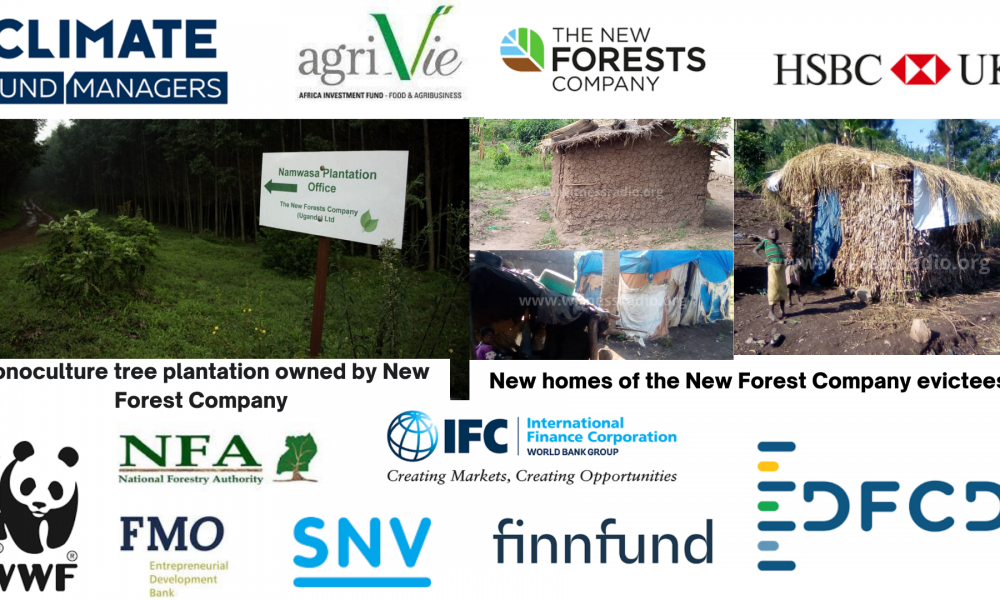DEFENDING LAND AND ENVIRONMENTAL RIGHTS
The New Forests Company in Uganda: Villages Evicted, Deceived and Dumped into Poverty
Published
3 years agoon
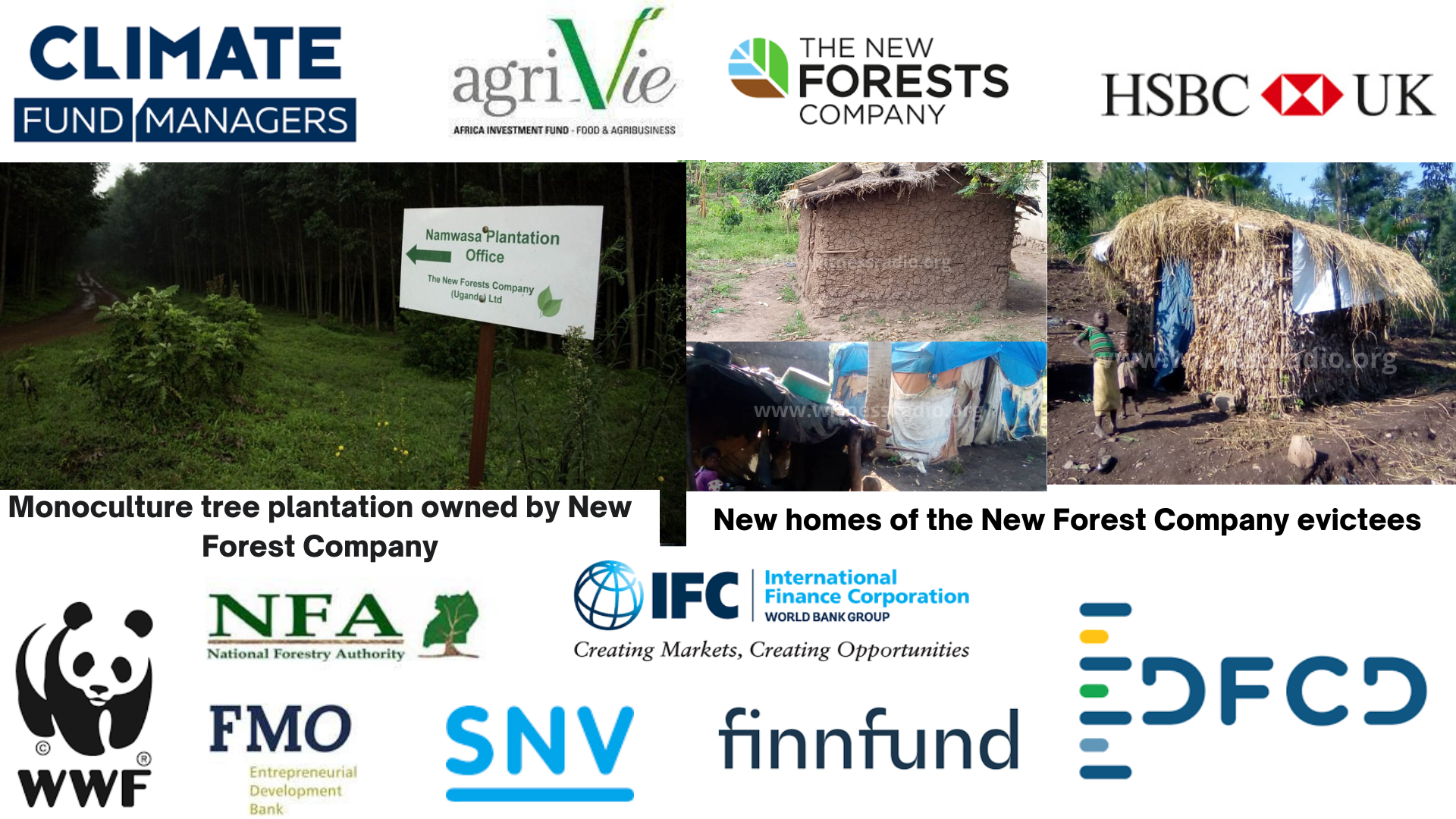
In the early 2000s, neighbouring villages envied Kanamire, a village located in the Mubende district, in the central region of Uganda. It had made a name in farming, and its story of success was spreading like a wild bushfire. Its inhabitants had set a high bar for anyone who practiced small-holder farming. The arable land and farming practices was the magic behind their success.
Kanamire’s villagers used to spend the entire day either tilling their gardens or weeding their crops in anticipation of a bountiful harvest.
“The population in the village had surged and was now entirely thriving on farming. Bigger and sprawling shops were everywhere. Houses made of baked brick were replacing the grass thatched ones. We proudly called it home,” 54-year-old Obutu Danial reminiscences about the heydays.
As a norm, amongst the rural women, there is an unwritten creed of maintaining peace with your neighbours. The first person to harvest, at least, shared part of the harvest with the neighbours. This belief had stood the test of time and Kanamire’s women were no exception. “We had enough land. We grew enough food for the families. We would give yields to our neighbours, for example beans, and in return, they would also do the same when theirs are ready. And [we would] also sell the surplus to cater for other needs”, a woman farmer reveals.
Twenty years down the road, the exemplary village no longer exists. Acreages of banana, coffee and maize crops, among others, were razed down, and families were brutally evicted by the London-based New Forests Company (NFC).
New Forests Company and the carbon market
NFC was founded in 2004 with the “vision” of producing “sustainable” timber in East Africa amidst rampant deforestation. It was funded by Agri-Vie Agribusiness Fund, a private equity investment fund, and UK-bank HSBC Private Equity. The East Africa region in which Uganda lies is one of the most fertile regions and thus, it was chosen for the plantations business.
In 2005, the tree plantations company signed a deal with Uganda’s National Forestry Authority (NFA) to develop 20,000 hectares of tree plantations in the Namwasa and Luwunga forest reserves under the carbon trading program, a market-based approach to privatize the carbon dioxide stored in trees for selling it as carbon credits to polluters. This generates additional profits for the Company.
NFC is currently also benefiting from a new project supported by the Dutch Fund for Climate and Development (DFCD); a 160 million euros (more than 185 million dollars) from Dutch government fund that aims to mobilize private sector finance into carbon projects. The DFCD is managed by investment manager Climate Fund Managers (CFM), NGO Worldwide Fund for Nature Netherlands (WWF-NL) and NGO SNV, and it is led by the Dutch Development Bank, FMO. (1)
On august 2020, DFCD approved a 279,001 euros (around 327,000 dollars) grant and WWF technical assistance package for The New Forests Company (NFC), with the aim of developing the final business investment proposal for carbon certification in Uganda, for sustainable smallholder growth and timber market diversification. This in reality would translate into generating carbon finance to support expanding their monoculture plantations and land grabbing.
The Kanamire village’s eviction
The National Forestry Authority (NFA) is a Government agency established under the National Forestry and Tree Planting Act of 2003, as a corporate body responsible for the so-called “sustainable development,” the management of Central Forest Reserves (CFRs) and the provision of technical support to stakeholders in the forestry sub-sector.
Between 2006 and 2010, more than 10,000 people were evicted from their lands in the district of Mubende to make way for the NFC plantations. Despite this, in 2008, the Uganda Investment Authority, which is mandated to “advise Government on appropriate policies conducive for investment promotion and growth” (2) named NFC an ‘Investor of the Year’ for planting monocultures of pines and eucalyptus while villagers miserably live on a barren and crowded piece of land.
In February 2010, residents of Kanamire woke up to a hail of NFC representatives and graders, who were under the protection of the Uganda People’s Defense Forces (UPDF) and the Uganda Police Force (UPF), which in turn were under the command of the then Mubende Resident District Commissioner Nsubuga Bewaayo. They destroyed the villagers’ properties worth billions of Uganda shillings before the forced eviction, to give way for a NFC monoculture plantation.
The others villages that suffered forced eviction in the Mubende district due to NFC plantations are Kyamukasa, Kigumya, Kyato, Kisita, Mpologoma, and Bulagano villages.
Three years after the evictions, NFC agreed to resettle victims after fretful engagements with human rights activists and other villagers’ supporters addressing the violence that locals experienced during the evictions.
In an agreement signed by the company and the villagers of Kanamire, NFC agreed to pay them a total of 1.2 billion Uganda Shillings (around 340 thousand dollars). And residents were requested to form and join a cooperative society, which would allocate half of the money to buy land and the other half to cater development projects, such as boreholes and schools. Evictees were forced to pay subscription fees to become a member. Those that had no money by then to join the cooperative, were not included in the resettlement process. (3)
“We formed Bukakikama Cooperative Society and 600 million [Uganda Shillings] for land was wired on the cooperative account,” (around 170 thousand dollars) Mr. Bakesisha William, the former cooperative chairman said.
Mr. Bakesisha said the 600 million Uganda Shillings bought land equivalent to 473 acres (around 190 hectares) in the Kampindu village, in the Mubende district. Out of the 901 families, 453 were allocated 1 acre (less than half an hectare) of land. The remaining 448 families haven’t been compensated or resettled up to date.
Everyone in the cooperative had to pay 30,000 Uganda Shillings (around 8.5 dollars) to join. There were additional payments victims had to make, namely: 3,000 Uganda Shillings (almost one dollar) for having a share in the Cooperative and 5,000 Uganda Shillings (1.42 dollars) as the initial saving pot. Upon the fulfilment of the above required payments, the cooperative chairman would issue identification numbers.
And only those who had met such requirements would be registered as an eligible member of the cooperative to benefit from one acre of land to resettle.
In Kampindu, the place where the evictees from Kanamire were ‘resettled’, malnourished children in tattered clothes wandering all over the village are your first sight. The angry, hungry and mean-looking youth and their fatigued elders are crowded in makeshifts and muddy houses. Others with hoes on their backs and dirty feet reveal their destitution.
Even those that received one acre of land are not in any way better than those that did not receive it. They too are wallowing in poverty. They were resettled on a barren piece of land.
It has been established that even what is supposed to be claimed as resettlement has not been met. No relief support was offered, like basic housing, foodstuffs, water or clothing. They were dumped and abandoned by the UK-based multimillionaire company.
“Both groups are living poor lives. Those that got a chance to resettle on an acre of land are suffering. The land is too small to cultivate. It is located in hilly areas that can’t either be built in or be farmed. And the others that had no chance are starving and working as labourers on other people’s plantations for survival. About 5 cases of fatality resulting from the displacement have been recorded in the areas,” a researcher at Ugandan media platform Witness Radio noted.
Mr. Rwabinyansi Charles is one of those that were allocated land in Kampindu. The 75-year-old father of 11 cannot forget the ruthless manner in which NFC grabbed his land and threw him at Kampindu, a place he describes as hell.
“It is as if I don’t have land. Look, it is filled with stones hard to build in or farm. When you plant crops, they dry. Look at the maize that was planted last season,” he said while referring to a piece of land he had received from NFC.
11 years back, Mr. Rwabinyansi was a happy villager. Before his eviction, he had 30 acres (around 12 hectares) filled with crops of coffee, bananas, cassava, among others. Besides this, he also practiced animal husbandry on his land.
“On a good season, I would harvest over 30 bags of coffee, 20 of maize, and 15 of cassava. I would sell them while my wife at home would grow what fed us. We also sold the milk from our four cows, so it was indeed a good life,” he narrated.
Now, on a well-wisher’s piece of land in Kampindu, stands a makeshift tent that Mr. Rwabinyansi and his family call home, but that is just the tip of the iceberg. Not even death will relieve the eviction-related pain because even in death, the eviction has continued to haunt them.
“I cannot build on that land. It is not safe for me. I cannot also build here, because any time, the owner may want to use it. I recently lost my daughter in law and I had nowhere to bury her”, he reveals.
When someone dies, among the Baganda indigenous, a condolence message is accompanied with a decent burial and a farewell message to the deceased, “Wummula mirembe” which is akin to “Rest in Peace”, however, this was not the case for Mr. Rwabinyansi’s daughter in law. “We struggled to get where to bury her. But finally, God had mercy on us. A nearby friend gave a portion of his land to lay her to rest,” he added.
The chairperson of the affected communities for NFC, Mr. Julius Ndagize, faults the criteria that informed the processes of allocating the evictees the one-acre piece of land.
“Firstly, the land is too small to accommodate all of us, and the procedures of first buying shares and savings in the cooperative were also not favouring my people since they had no money. People including those who got land to have nothing to eat. Imagine a family of 15 children, all have grown and built on the same land, where will they dig. The only benefit that the group which got land has ahead of those that did not get is that they have where to bury their beloved ones,” he explained.
The pain of losing a promising young generation to an eviction
The evictees are now grappling with shocking eviction-related consequences, including child pregnancies, child labour, and school dropouts.
“Cases of early marriages and child labour are high in the area, children no longer go to school because ideally if a parent lacks what to eat, can he educate a child. And people are dying because they have no money to go to the hospitals” he further said.
Mr. Ndagize said the smallholder farmers are now working as casual labourers. “Given the fact that the land is small and infertile, these people go and work in the neighbouring farms to get what to eat,” he added.
Smallholder farmers’ contribution to the national food basket remains unrivalled, but when you speak to them, they believe they have been let down by their government, and thrown under the bus by multinationals like NFC.
“If agriculture is the backbone of Uganda as they say, why do they take the small we have, we were not starving, and neither were we begging anyone. But look at me now. Next time you will either find me on the streets begging or dead in my house,” depressed villager Rwoga Nyange concludes.
Efforts to talk to the Corporate Social Responsibility Programme Manager from New Forests Company, Mr. Kyabawampi Alex, were unsuccessful, as he did not respond to Witness Radio’s emails by press time.
Witness Radio – Uganda
(1) WWF, The DFCD supports in carbon certification in Uganda, August 2020, https://www.wwf.nl/wat-we-doen/aanpak/internationaal/Dutch-Fund-for-Climate-and-Development/The-DFCD-supports-in-carbon-certification-in-Uganda
(2) Uganda Investment Authority, https://www.ugandainvest.go.ug/about/
(3) Witness Radio, The Agony of a Tree-Planting Project on Communities’ Land in Uganda, in WRM Bulletin 251, September 2020, https://wrm.org.uy/articles-from-the-wrm-bulletin/section1/the-agony-of-a-tree-planting-project-on-communities-land-in-uganda/
This article was first published by WRM Bulletin 257 on 27th/Septmember/2021
Related posts:

 The New Forest Company is engaged in fresh tactics to intimidate affected community it evicted 10 years ago…
The New Forest Company is engaged in fresh tactics to intimidate affected community it evicted 10 years ago…
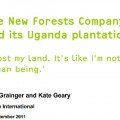 The New Forests Company and its Uganda plantations
The New Forests Company and its Uganda plantations
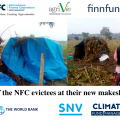 After 15 years of anguish, NFC evictees reunite to rent land to fight food insecurity
After 15 years of anguish, NFC evictees reunite to rent land to fight food insecurity
 Corporates count profits from palm oil plantations grown on a grabbed land, as former landowners reduced to a poverty-stricken community…
Corporates count profits from palm oil plantations grown on a grabbed land, as former landowners reduced to a poverty-stricken community…
You may like
DEFENDING LAND AND ENVIRONMENTAL RIGHTS
Crackdown on EACOP protesters intensifies: 35 Activists arrested in just four months.
Published
2 months agoon
April 30, 2025
By Witness Radio team.
Ugandan authorities’ ongoing crackdown on anti-EACOP protest marches is spreading rapidly like wildfires. The East African Crude Oil Pipeline (EACOP) Project, a significant oil infrastructure development, has been a point of contention. Recently, Witness Radio warned that criminalizing the activities of individual activists and environmental defenders opposed to this project, which aims to transport crude oil from Hoima in Uganda to the Port of Tanga in Tanzania, will be regarded as the most disastrous and insensitive to communities’ concerns in Uganda’s history.
In just four months, a series of arrests targeting environmental activists opposing the mega oil project that transports crude oil from Hoima in Uganda to the Port of Tanga in Tanzania has resulted in a scene of crime. No one is allowed to express their concerns peacefully about it and push back on its adverse negative impacts.
While activists view the peaceful marches as a rightful and brave effort to protect the environment and the communities affected by the project, the authorities, including the Uganda police and Prosecutor’s office, regard these actions as attempts to sabotage development projects and resort to criminalization.
Activists and civil society organizations’ reports indicate that the project will likely damage the environment and has displaced thousands of local communities in Uganda and Tanzania.
Despite growing concerns and an intensified crackdown, project financiers and shareholders remain unwavering in supporting the EACOP project. This steadfast support underscores the urgency of the situation. However, environmental and human rights defenders stand firm, resolutely demanding the project’s halt, showing a glimmer of hope in this challenging situation.
Over last weekend, eleven (11) environmental activists were arrested, charged, and sent to prison. They were arrested and detained by police at Kenya Commercial Bank (KCB) premises while attempting to deliver a petition urging the bank to halt its financial support for the 1,444-kilometer heated pipeline project.
The arrest of the eleven activists comes less than a month after nine activists were detained on April 02 outside the Stanbic Bank headquarters while attempting to deliver a petition urging the bank to halt its funding for the project.
The eleven include Bob Barigye, Augustine Tukamashaba, Gilbert Ayebare, Umar Kasimbe, Joseph Ssengozi, Keith Namanya, Raymond Bituhanga, Mohammed Ssentongo, Paul Ssekate, Misach Saazi and Phionah Nalusiba.
KCB Bank Uganda is one of the banks that recently joined the race to fund the EACOP project. Last month, On March 26, 2025, EACOP Ltd., the company in charge of the construction and future operation of the EACOP project, announced that it had acquired additional financing provided by a syndicate of financial institutions, including regional banks such as KCB Bank.
Other banks in the syndicate include the Stanbic Bank Uganda, the African Export-Import Bank (Afreximbank), the Standard Bank of South Africa Limited, and the Islamic Corporation for the Development of the Private Sector (ICD).
The activists appeared before the Nakawa Chief Magistrate Court on April 25. They were charged with criminal trespass. According to section 302 of the Penal Code, a person convicted of criminal trespass is liable to a maximum sentence of one year in prison. This detail underscores the weight of the situation.
The activists are currently on remand at Luzira Maximum Prison and are expected to appear again before the court on May 08, 2025, for mention.
Related posts:

 The latest: Another group of anti-EACOP activists has been arrested for protesting Stanbic Bank’s financing of the EACOP Project.
The latest: Another group of anti-EACOP activists has been arrested for protesting Stanbic Bank’s financing of the EACOP Project.
 Another group of eleven environmental activists have been charged with common nuisance and remanded to Luzira Prison for opposing the EACOP project.
Another group of eleven environmental activists have been charged with common nuisance and remanded to Luzira Prison for opposing the EACOP project.
 Breaking: Eight (8) environmental activists have been arrested by police over protesting against the EACOP project.
Breaking: Eight (8) environmental activists have been arrested by police over protesting against the EACOP project.
 Breaking: 15 Anti-EACOP Activists Arrested in Kampala While Marching to Parliament
Breaking: 15 Anti-EACOP Activists Arrested in Kampala While Marching to Parliament
DEFENDING LAND AND ENVIRONMENTAL RIGHTS
Witness Radio Petitions ODPP urgently to review and withdraw criminal charges against Buvuma Community Land Defenders.
Published
3 months agoon
April 14, 2025
By Witness Radio team.
As Ugandan courts increasingly become tools of oppression, Witness Radio is deeply concerned about the growing trend of weaponizing the justice systems against communities, land, and environmental defenders who resist land grabbing and other harmful land-based investments.
In a well-calculated tactic, land grabbers and investors continue to collude with security agencies, particularly the police, to arrest violently and courts of law to maliciously prosecute hundreds of these defenders for either fighting back against the land-grabbing schemes or criticizing harmful land-based investments in Uganda.
This trend of persecution is not isolated to Buvuma but is a continuous threat in many other parts of Uganda. Buvuma, in particular, is a hotbed of injustice, where the government of Uganda, in collaboration with BIDCO, is implementing the National Oil Palm Project (NOPP) to expand palm oil growing in Uganda.
In our article dated March 5th this year, Witness Radio revealed how community land defenders in Buvuma continued to face judicial harassment on trumped charges simply for defending their land from being grabbed for palm oil plantations.
The accused defenders are residents of the Magyo and Bukula villages in the Buvuma district.
More than a dozen smallholder farmers in these villages situated in Nairambi Sub-county are facing violent evictions from their land and unending persecution. They have been framed with criminal charges for refusing to give away their land for palm oil growing.
The victims are legal owners of bibanja duly registered by Buganda Land Board and recognized as tenants by Buganda Land Board.
Buvuma College school is claiming ownership of the land, while Buvuma district officials, under the guise of protecting Kirigye Forest Reserve, also claim the same land on which these individuals have settled lawfully for decades.
Several community members have been arrested and charged with false criminal offenses.
Among them include community land rights defender Ssentongo, who is currently battling with cases CRB:301/2023, accused of illegally occupying Kirigye forest land (offense of carrying out prohibited activities in forest reserve).
CRB 232/2024 with complainant Kabale Denis (District Forest Officer) charged with carrying out prohibited activities in the forest reserve and CRB 098/2023 on criminal trespass with Buvuma College administration, the complainant.
Others facing persecution are Steven Kyeswa, Kisekwa Richard, and Kibondwe Chrysostom on CRB 141/2024 with assault occasioning actual bodily harm vide Criminal Case No 075 of 2024, among other cases.
As part of efforts to end the ongoing oppression of community defenders in Buvuma, Witness Radio has petitioned the Office of the Director of Public Prosecutions to urgently intervene, review, and withdraw the charges unjustly brought against these defenders.
According to the petition dated March 7th, 2025, the sole intention of these charges is to grab community land without any merits as criminal charges. Sarah Adong, one of the staff attorneys and Head of Witness Radio Legal Aid, reveals that the matters against the accused persons before the court point to the question of land ownership, which can only be answered through civil suits and not criminal charges. It is an apparent injustice.
“Upon thoroughly examining the facts, evidence, and circumstances surrounding these charges, it is evident that they have no merit whatsoever. They amount to vexatious and frivolous prosecution that serves no genuine interest of justice,” the petition by the Land and Environmental Rights Watchdog mentioned.
In an unusual turn of events, the Witness Radio Legal Aid team observed that some of the defenders, including Sentongo, have been charged with criminal trespass twice by the same complainant vide CC No 325 of 2020 and are now facing the same charge by the same party vide CC No 062/2023. This repeated persecution is a heavy burden on these defenders.
“The charges against our client undermine the accused person’s rights under Article 29 (9) of the Constitution of the Republic of Uganda. It has proven that the cases brought against our clients are frivolous and vexatious as they are instituted in a manner that constitutes abuse of court processes,” the petition further read.
Therefore, the organization strongly urges the office of the DPP to exercise its prosecutorial discretion under relevant legal provisions. This is crucial for the prevalence of equity, justice, and good conscience and reaffirming the prosecution process’s integrity and objectivity.
Related posts:

 Witness Radio petitions chief prosecutor: Want 34 community land rights defenders and activists released from prison.
Witness Radio petitions chief prosecutor: Want 34 community land rights defenders and activists released from prison.
 Palm Oil project investor in Landgrab: Witness Radio petitions Buganda Land Board to save its tenants from being forcefully displaced palm oil plantation.
Palm Oil project investor in Landgrab: Witness Radio petitions Buganda Land Board to save its tenants from being forcefully displaced palm oil plantation.
 Court charges and remands two community land rights defenders and eight farmers to prison
Court charges and remands two community land rights defenders and eight farmers to prison
 Uganda: Targeting community land and environmental defenders with criminal offenses is rising as two community land rights defenders arrested in a hotspot district of forced land evictions.
Uganda: Targeting community land and environmental defenders with criminal offenses is rising as two community land rights defenders arrested in a hotspot district of forced land evictions.
DEFENDING LAND AND ENVIRONMENTAL RIGHTS
Milestone: Another case against the EACOP activists is dismissed due to the want of prosecution.
Published
3 months agoon
April 8, 2025
By Witness Radio team.
The Buganda Road Chief Magistrate has dismissed another case against 20 anti-EACOP activists due to want of prosecution.
Yesterday, on April 7, 2024, her worship, Jalia Basajjabalaba, dismissed the case against the 20 activists. The case was dismissed after the state failed to produce witnesses pinning the activists on a common nuisance charge after close to 9 months of case trial.
On August 26, 2024, the 20 activists, including Pitua Robert, Okwai Stephen, Kothurach Margret, Omirambe Moses, Owonda Rogers, Alimange Joseph, and Wabiyona Wicklyf, among others, were arrested while peacefully marching to the Ministry of Energy to deliver a petition opposing EACOP and other oil projects. On August 27, 2024, they were arraigned before Court and charged by the Buganda Road Magistrate with common nuisance.
After nearly nine months of trial, the state failed to present a single witness, prompting the magistrate to close the case file.
Although the case against the activists has been dismissed, they remain deeply dissatisfied with the continued pattern of arrests and charges, which often collapse in Court due to a lack of evidence.
Bob Barigye, one of the activists whose case was dismissed, expressed concern over what he described as deliberate attempts to frustrate and silence voices critical of the EACOP project.
“We are saddened that it was just dismissed after eight months of pacing up and down to Court.
We are disappointed that the magistrate did not award us any cost or compensation for the dismissed case, meaning that the state failed to prove that we were a public nuisance and that we were citing violence as activists. Many of us have been forced to travel long distances from our villages to attend court sessions in Kampala — only for the state to produce no evidence against us. It’s a clear waste of our time, energy, and resources. But beyond that, it’s an attempt to discourage us from speaking the truth about the dangers of the EACOP project,” Barigye said.
Barigye added that the activists are already engaging their lawyers to explore further legal remedies in higher courts, demonstrating their unwavering commitment to justice and their cause.
“It is frustrating and deeply disappointing that we are dragged to Court and disrespected every time we stand up against this deadly pipeline, the East African Crude Oil Pipeline (EACOP). But we were ready to face this battle in Court because we knew we had committed no crime by delivering a petition,” Barigye said, expressing the activists’ exasperation with the legal process.
Shortly after their last Court appearance on February 20, the 20 accused activists, during a press briefing, demanded that the judiciary stop delaying hearings of their case related to the EACOP project and called for the dismissal of their case if the Court lacks sufficient evidence to prosecute them.
“The courts of law should not be used as tools of oppression. They should not waste any time. If we have a case to answer, let them prosecute us on April 7, which they have scheduled. If they fail again, they should dismiss the case instead of wasting our time and resources,” the activists emphasized, reiterating their demand for a fair and expedited legal process.
This is the second milestone achieved by the Stop EACOP activists in less than two months in their continued campaign against the EACOP pipeline. In February 2025, the Court also dismissed a common nuisance case against the 15 EACOP activists due to the lack of prosecution.
“The state doesn’t present a single witness in all the cases that have always been preferred against us. No witnesses have come along to say that these people were unruly. As activists, we want to investigate this further and go to the Constitutional Court to learn what constitutes a nuisance. Whoever is demonstrating peacefully is arrested and charged with a public nuisance. This charge is coronial and very demeaning. We want to go ahead and challenge this,” Barigye revealed, outlining the activists’ proactive plans to challenge the charge of public nuisance.
The EACOP project has long been controversial, with environmental activists arguing that it poses a significant environmental risk and has already left a trail of human rights abuses in the communities hosting it in Uganda and Tanzania.
The EACOP is a 1,443-kilometer heated pipeline transporting crude oil from Hoima, Uganda, to Tanga, Tanzania. The first 296 kilometers run through Uganda, while the remaining 1,147 kilometers pass through Tanzania. The project is a joint venture between TotalEnergies, the Uganda National Oil Company (UNOC), the Tanzania Petroleum Development Corporation (TPDC), and the China National Offshore Oil Corporation (CNOOC).
Related posts:

 Another group of eleven environmental activists have been charged with common nuisance and remanded to Luzira Prison for opposing the EACOP project.
Another group of eleven environmental activists have been charged with common nuisance and remanded to Luzira Prison for opposing the EACOP project.
 Breaking: The Bail Application for the 15 EACOP Activists flops for the second time, as the trial magistrate is reported to have been transferred.
Breaking: The Bail Application for the 15 EACOP Activists flops for the second time, as the trial magistrate is reported to have been transferred.
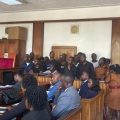 Breaking: Buganda Road Court grants bail to 15 stop EACOP activists after 30 days in prison.
Breaking: Buganda Road Court grants bail to 15 stop EACOP activists after 30 days in prison.
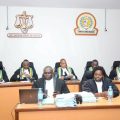 EACJ’s Appellate Court will hear an appeal on the dismissed Case against EACOP development.
EACJ’s Appellate Court will hear an appeal on the dismissed Case against EACOP development.

Activism on Trial: Despite the increasing repressive measures, Uganda’s EACOP protesters are achieving unexpected victories in the country’s justice systems.

Communities Under Siege: New Report Reveals World Bank Failures in Safeguard Compliance and Human Rights Oversight in Tanzania

A decade of displacement: How Uganda’s Oil refinery victims are dying before realizing justice as EACOP secures financial backing to further significant environmental harm.

Carbon Markets Are Not the Solution: The Failed Relaunch of Emission Trading and the Clean Development Mechanism

A decade of displacement: How Uganda’s Oil refinery victims are dying before realizing justice as EACOP secures financial backing to further significant environmental harm.

Govt launches Central Account for Busuulu to protect tenants from evictions

Activism on Trial: Despite the increasing repressive measures, Uganda’s EACOP protesters are achieving unexpected victories in the country’s justice systems.

Top 10 agribusiness giants: corporate concentration in food & farming in 2025

Innovative Finance from Canada projects positive impact on local communities.
Over 5000 Indigenous Communities evicted in Kiryandongo District
Petition To Land Inquiry Commission Over Human Rights In Kiryandongo District
Invisible victims of Uganda Land Grabs
Resource Center
- LAND GRABS AT GUNPOINT REPORT IN KIRYANDONGO DISTRICT
- RESEARCH BRIEF -TOURISM POTENTIAL OF GREATER MASAKA -MARCH 2025
- The Mouila Declaration of the Informal Alliance against the Expansion of Industrial Monocultures
- FORCED LAND EVICTIONS IN UGANDA TRENDS RIGHTS OF DEFENDERS IMPACT AND CALL FOR ACTION
- 12 KEY DEMANDS FROM CSOS TO WORLD LEADERS AT THE OPENING OF COP16 IN SAUDI ARABIA
- PRESENDIANTIAL DIRECTIVE BANNING ALL LAND EVICTIONS IN UGANDA
- FROM LAND GRABBERS TO CARBON COWBOYS A NEW SCRAMBLE FOR COMMUNITY LANDS TAKES OFF
- African Faith Leaders Demand Reparations From The Gates Foundation.
Legal Framework
READ BY CATEGORY
Newsletter
Trending
-

 SPECIAL REPORTS AND PROJECTS4 days ago
SPECIAL REPORTS AND PROJECTS4 days agoActivism on Trial: Despite the increasing repressive measures, Uganda’s EACOP protesters are achieving unexpected victories in the country’s justice systems.
-

 NGO WORK1 week ago
NGO WORK1 week agoCommunities Under Siege: New Report Reveals World Bank Failures in Safeguard Compliance and Human Rights Oversight in Tanzania

